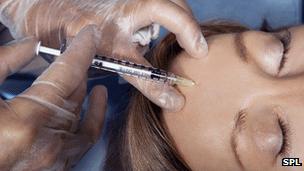Not enough evidence for Botox migraine jab, says NICE
- Published

Botox is more commonly used for cosmetic reasons
The anti-wrinkle drug Botox is unlikely to be recommended for the treatment of chronic migraines on the NHS in England and Wales, the medicines watchdog said.
The National Institute for Health and Clinical Excellence (NICE) has saying there is insufficient evidence.
It wants the manufacturer, Allergan, to provide better data before making a final decision in June.
The Migraine Trust said the decision was disappointing.
Migraines are severe headaches, which are often accompanied by nausea and vomiting and finding light or sound painful. Chronic migraines are defined as headaches at least 15 days a month, eight of which have to be migraines.
In July 2010, Botox was for chronic migraine in the UK by the Medicines and Healthcare Products Regulatory Agency. NICE is deciding whether the injection should be offered across the NHS in England and Wales.
Botox is injected into at least 31 sites around the head and neck every 12 weeks. However, how the neurotoxin might prevent chronic migraines is unknown. One thought is that it relaxes the muscles or possibly interrupts pain signals.
NICE said the injections had been "shown to have some benefit" such as in a trial involving 1,384 patients, .
However, it said the effect was small and may have been confused by the way the studies have been conducted. A review in the in February 2011 said the was "limited evidence" for using Botox.
Prof Carole Longson, director of the health technology evaluation centre at NICE, said: "Our independent committee is asking Allergan to provide further information and analysis as part of this public consultation, so that it has sufficient evidence to develop sound advice for the NHS regarding the use of Botox for the prevention of headaches in adults with chronic migraine.
"Without this additional evidence, potentially we will be unable to advise the NHS that this drug is good value for money for these adults because there are currently too many uncertainties."
NICE estimated the cost to the NHS would be 拢349.40 for every 12-week cycle of treatment.
Allegan said it was "working constructively" and would provide new evidence to NICE which it said would demonstrate "that treatment with Botox is both a cost effective and clinically meaningful treatment option for patients suffering from this debilitating condition".
The chief executive of The Migraine Trust, Wendy Thomas, told the 大象传媒: "I'm a bit disappointed really.
"For these people with chronic migraine, they've already tried various preventative treatments which have failed. For these people their only hope is Botox.
"It doesn't work for everybody - it can change people's lives or not make very much difference."
- Published27 September 2010
- Published10 July 2010
- Published9 February 2011